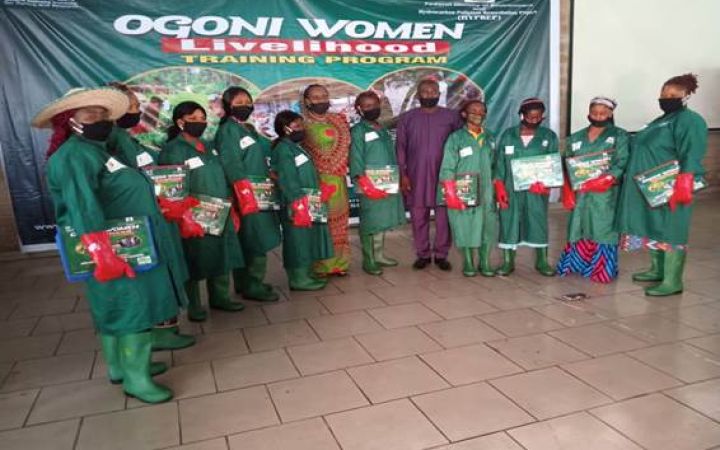400 Ogoni women benefited from capacity building training in agribusiness and entrepreneurship organized by UNITAR in collaboration with Federal Government of Nigeria
5 November 2020, Port Harcourt, Nigeria - A total of 400 women selected from the four Ogoni Local Government Areas comprising of Eleme, Tai, Khana and Gokana in Rivers State, Nigeria have benefited from an Agribusiness Skill Training and Empowerment Programme which held from 19th July to 26th September 2020, organized by UNITAR in collaboration with the Federal Government of Nigeria.
Implemented by UNITAR and the Hydrocarbon Pollution Remediation Project (HYPREP), an agency established under the Federal Ministry of Environment to coordinate activities aimed at remediating impacted communities in Ogoniland and ensure livelihoods and sustainable development in the region, the programme is as an integral part of recommendations proposed by UNEP in its report on Environmental Assessment of Ogoniland, Rivers State, Nigeria.
The 2-stage project was aimed at exposing women from communities adversely affected by oil exploration and exploitation activities to innovations that would help them increase yields and earnings from agribusiness. The focus of the project on women is highly justified considering the impact of the situation on them and the significant contribution they make to farming.
At a stakeholder town hall and consultation forum which took place on 4th of February 2017, with former Minister for the Environment and presently, United Nations Deputy Secretary-General, Mrs. Amina Mohammed, as Chair, activities towards initiation of the programme began with feedback collected on areas such as criteria for selection of participants, ideas for converting skills to market, and other planning and post-training issues.
Thereafter, UNITAR, in collaboration with the Project Coordination Office, designed the training architecture based on the feedback gathered at the town hall meeting. The 400 participants who benefitted from the programme were the first set of beneficiaries in a training initiative which has been targeted to produce a total of 1200 beneficiaries at the end of the project.
The training programme began with an opening address and solidarity messages from officials of HYPREP and UNITAR, followed by other activities such as a well-structured Orientation Programme, Health, Safety, Security and Environment (HSSE) briefings; and Pep talk on code of conducts. Thereafter, the trainees were divided into their chosen skill choices including: Poultry production; Fish farming; and Crop production. This was followed by hands-on training at the various training units.
100 women were trained from each Local Government Area. The first batch of the training commenced at the Songhai Rivers Development Initiative farm on 19th July, 2020 and lasted for one week. The last batch, which commenced on the 19th of September, ended on 26th September 2020.
Given challenge of the COVID-19 pandemic and need to adapt delivery plan in line with the guidelines stipulated by the Federal Government of Nigeria, UNITAR worked closely with all parties to ensure that the training facility and all activities were COVID-19 compliant including redesigning the original 4 batches to 10 batches to reduce the number of trainees per batch, and providing hand sanitizers/wash hand basins and soaps at strategic points, among others.
During the one month intensive training, experienced resource persons from Songhai Rivers Initiative delivered hands-on agricultural skills training tailored towards building capacity through exposure to the following fields: Aquaculture; Poultry; Crop production; Agro-food processing (feed formulation etc.); Entrepreneurship training - farm business management; Civic Education; and Peace building and conflict resolution in communities.
The inclusion of social activities in the training programme helped enrich the programme. Also, introduction of modules in civic training, peace building and conflict resolution and community leadership skills promoted efforts to strengthen role of women in peacebuilding in the region.
At the end of the programme, it was evident that the training met its core objective. Among other benefits, the programme provided opportunity for knowledge sharing, particularly in the areas of modern farming techniques between resource persons and the trainees. Also, a participant who formulated a business plan to facilitate the setting up a poultry business was able to realize her goal of setting up a poultry. As at date, the poultry business has commenced and is progressing well. In addition, the training helped establish a supply chain network and synergy between Songhai farm and the trainees for the supply of day-old chicks (DOC), and opened access to local markets and networking for them.
With the successful conclusion of training of the 400 beneficiaries, communities in the region have implored the Federal Government of Nigeria to facilitate commencement of second stage of the programme by facilitating UNITAR to begin work on the next batch.


